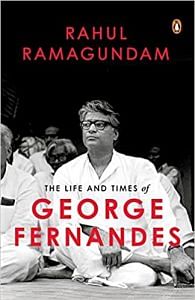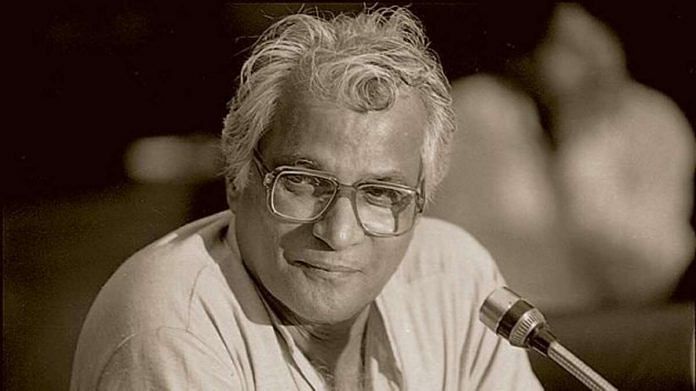The hunt would last a full year. At the end of it, when the investigating sleuths pieced together bits of evidence, they discovered a trail that had its nebulous beginning in the sleepy hamlet of Gopalpur-on-sea in Orissa (now Odisha) where Leila Kabir Fernandes had prevailed upon George to spend some time with the family. Here, in June 1975 when it had all begun, she, along with their seventeen-month-old son Sushanto and her mother Shanti Das Kabir, had been awaiting George’s arrival. And here, on 26 June, within hours of his arrival, George would resolve ‘to spare nothing, nothing at all, my life included, to fight and overthrow this dictatorship’.
Life had been frenetic since their wedding in July 1971. The swirling political and trade union campaigns kept him on the move, barely leaving them time together. A fortnight before their wedding, she had pleaded with him to settle the Bombay taximen’s issue without a call to strike so that he could come on time. With a disconcerting innocence, she had then asked, ‘Do you have some time to be with just yourself in the midst of all your hectic activities . . . just you and your thoughts? The nudge must have baffled him, he who revelled in action soaked in the sweat of the working people. But perhaps the soothing warmth of a newly fashioned love and promise of a wedded future together made him, and her as well, overlook the seedling of divergence between them. It didn’t help, though, when the marriage failed to slow him down. She felt increasingly lonely as he most often was not there. ‘I am thinking of you, . . . my beloved husband,’ she wrote unhappily a year after their wedding, ‘sitting on my bed . . . wondering where you are, what hectic programmes are being arranged.’The letter is a litany of loneliness. She wrote of chirping sparrows that gave her company and of movies she saw to pass time, including a Czech film A shop on the high street. In order to get him interested, she provided a synopsis of the movie: it was about the ‘poignancy of human dilemma when the individual gets trapped in the soulless machinery of state policy’. Was this a cue for her politician-husband, a hint that he should slow down and savour the moment? Or was it simply an indication of her own desperate life which she wished he would notice? One other movie she saw was the Japanese film made in 1967—Portrait of Chieko. This experience was a disaster. The movie, as she wrote to him, was a ‘very romantic true story of a sculpture’s love for a girl who lost her mind after failing to qualify for some art competition’. But halfway through the movie, the newly married Leila Fernandes felt sick and rushed out of the theatre. She managed somehow to reach home, where she had a severe bout of vomiting. It was a vital bodily sign calling attention to her complicated emotional state. But she shrugged the symptoms away as caused by a possible overdose of medication she was on against a bacterial infection. ‘These modern drugs,’ she wrote, as if to provide a persuasive cover to her explanation, ‘are too toxic. In curing one condition they give five new diseases.’ But that she was ridden with anxieties and laden with restlessness was an inadvertent revelation when she wrote with some dread, ‘I have no business to below but I am.’ Her misery made her take notice of death occurring in the vicinity. A neighbour who had married late and had three young children died of a heart attack at a relatively young age of 52. Terribly shaken, she wrote, ‘The widow is in a daze, weeping bitterly.’ The neighbour’s death made fears of mortality creep into her. They too had married late; George was 41 and she 34 when they were married.
‘Darling, what is it all about?’ she inquired, in confusion, and perhaps also seeking some consolation, ‘. . . True we make our own destiny, but it is in some kind of a framework not entirely in our control.’ The starkness of truth saddened her more in his absence and, as time went by unceasingly, on his refusal to surrender to a conjugal fate: ‘I missed you ever so much last night. I would have snuggled myself in your arms for comfort.’ And yet, knowing him, she would not ask him to return from wherever he was. She only wrote: ‘whatever I am doing I am always by your side, walking along with you, praying for success in all that you undertake to do.’ She expressed undying love and a lifelong commitment to stand by him ‘so that some of the dreams for this land and its people can be made into realities.’
Soon, she was pregnant. In those months when she carried Sushanto in her womb, though as they were, she had struggled consistently against her inner demons. She expected a ‘lot of patience and optimism’ from George but he was rarely there. In January 1974, Sushanto was born. In May, she carried little Sonny Boy in her arms to meet his father in jail. It was in the midst of the railway strike. Many years later, with their marriage floundering, but still refusing to blame him, she would think of those dreaded ‘post-1971’ days as mainly born of her own ‘nameless oubts and anxieties’, aggravated—and, this was as far as she would go in holding him responsible—by his ‘total absence of time investment’ in their marriage. He too would realize this and be remorseful. ‘The longest period’ they had spent ‘together uninterruptedly’ in the five years that they were married—he would recall in July 1976, sitting in a cage-like solitary cell in Hissar Jail, exposed to the elements during the day and kept under a scorching searchlight at night—was the four months in 1972 when they had toured the United States and Canada meeting members of the extended family. Jail is a strange place; it makes time weigh heavily on the conscience, so much so that the only relief one finds is in whipping up memories. Unsure how long his incarceration would last, he was apologetic: ‘Even when Sonny Boy was born, I could hardly spend a week with her.’ He would wonder if she had ‘bargained’ for all that when they had married: ‘My life and my work are not fair to her and Sonny Boy but she has borne it all, though I know at what cost.’ What she could not succeed in making him do when they were together, the jail’s solitude did. But it was a remorse that was late in coming and in prison where the seclusion made him think of what might have been rather than was.
Also Read: ‘Gandhi did not stop here at all’—Why people in Dandi don’t say he walked that route
It was therefore at Leila Fernandes’ insistence that a sort of family union was planned in the blissful isolation of this little fishing village of Gopalpur-on-sea. Little did she know that the family vacation she had long been planning would come to an abrupt end and in such a manner that she would be forced to stay away from her husband for the next 22 months. During those months, he either was a runaway, or in jail; and she, thousands of miles away, at first seeking a breather in a foreign land, and then getting sucked into a worldwide campaign to save his life. Months later, after he had successfully escaped the dragnet, he would reminisce in a moment of solitude: ‘That day, when I was getting ready to enter the underground, Sushanto was constantly calling out Daddy, as if he had sensed that it was a long, long war which we were getting involved in and it [would] be a long, long time before he would see and talk to his Daddy again.’Thereafter, his life was dangerously hinged and precariously lived: evading authorities, writing resistance, inciting action against the ‘dictatorship’ of Indira Gandhi. Yet, as the hunt gathered heat and he thought fondly of his family far away, although he was advised to escape, to give up this lone battle and join them abroad, he was even more resolute to not do so because his ‘work was in this country’. Seven months in the underground, with a reward on his head and Leila Fernandes’ passport impounded, he would write to a friend, ‘In the event of my arrest, Leila is not to return—no matter what reports are put out.’Someone sheltering him during those dangerous days recalled, ‘He used to say that he did not care if he was killed or what happened to his wife and child, but he would see to it that Indira Gandhi was forced to step down from her office.’ And, in this, there was ‘no retreat nor any room for any compromise’. He knew his mind well: ‘It is either freedom or death.’ He had made his choice long ago, ‘long before Madam became dictator when her emissaries offered me all that I would care to have except the prime ministership.
 This excerpt from ‘The Life and Times of George Fernandes’ by Rahul Ramagundam has been published with permission from Penguin Random House India.
This excerpt from ‘The Life and Times of George Fernandes’ by Rahul Ramagundam has been published with permission from Penguin Random House India.



